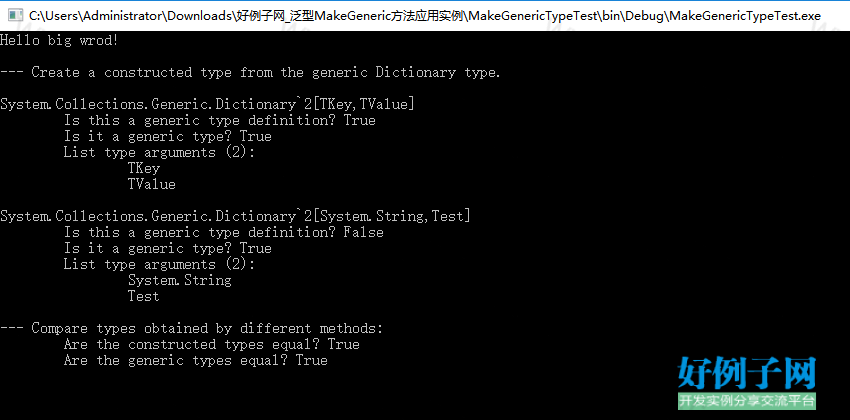实例介绍
【实例截图】

【核心代码】
using System;
using System.Reflection;
using System.Collections.Generic;
using MakeGenericTypeTest;
using MakeGenericTypeTest.InterFace;
public class Test
{
public static void Main()
{
Type[] tys = Activator.CreateInstance(typeof(SayHello), "big big word").GetType().GetInterface(typeof(ISay<>).Name).GetGenericArguments();
Type ty = typeof(BigWord<>).MakeGenericType(tys);
BigWord<ISayHello> obj = (BigWord<ISayHello>)Activator.CreateInstance(ty);
Console.WriteLine(obj.SayHello());
Console.WriteLine("\r\n--- Create a constructed type from the generic Dictionary type.");
// Create a type object representing the generic Dictionary
// type, by omitting the type arguments (but keeping the
// comma that separates them, so the compiler can infer the
// number of type parameters).
Type generic = typeof(Dictionary<,>);
DisplayTypeInfo(generic);
// Create an array of types to substitute for the type
// parameters of Dictionary. The key is of type string, and
// the type to be contained in the Dictionary is Test.
Type[] typeArgs = { typeof(string), typeof(Test) };
// Create a Type object representing the constructed generic
// type.
Type constructed = generic.MakeGenericType(typeArgs);
DisplayTypeInfo(constructed);
// Compare the type objects obtained above to type objects
// obtained using typeof() and GetGenericTypeDefinition().
Console.WriteLine("\r\n--- Compare types obtained by different methods:");
Type t = typeof(Dictionary<String, Test>);
Console.WriteLine("\tAre the constructed types equal? {0}", t == constructed);
Console.WriteLine("\tAre the generic types equal? {0}",
t.GetGenericTypeDefinition() == generic);
Console.ReadLine();
}
private static void DisplayTypeInfo(Type t)
{
Console.WriteLine("\r\n{0}", t);
Console.WriteLine("\tIs this a generic type definition? {0}",
t.IsGenericTypeDefinition);
Console.WriteLine("\tIs it a generic type? {0}",
t.IsGenericType);
Type[] typeArguments = t.GetGenericArguments();
Console.WriteLine("\tList type arguments ({0}):", typeArguments.Length);
foreach (Type tParam in typeArguments)
{
Console.WriteLine("\t\t{0}", tParam);
}
}
}
/* This example produces the following output:
--- Create a constructed type from the generic Dictionary type.
System.Collections.Generic.Dictionary`2[TKey,TValue]
Is this a generic type definition? True
Is it a generic type? True
List type arguments (2):
TKey
TValue
System.Collections.Generic.Dictionary`2[System.String, Test]
Is this a generic type definition? False
Is it a generic type? True
List type arguments (2):
System.String
Test
--- Compare types obtained by different methods:
Are the constructed types equal? True
Are the generic types equal? True
*/
标签: 泛型
小贴士
感谢您为本站写下的评论,您的评论对其它用户来说具有重要的参考价值,所以请认真填写。
- 类似“顶”、“沙发”之类没有营养的文字,对勤劳贡献的楼主来说是令人沮丧的反馈信息。
- 相信您也不想看到一排文字/表情墙,所以请不要反馈意义不大的重复字符,也请尽量不要纯表情的回复。
- 提问之前请再仔细看一遍楼主的说明,或许是您遗漏了。
- 请勿到处挖坑绊人、招贴广告。既占空间让人厌烦,又没人会搭理,于人于己都无利。
关于好例子网
本站旨在为广大IT学习爱好者提供一个非营利性互相学习交流分享平台。本站所有资源都可以被免费获取学习研究。本站资源来自网友分享,对搜索内容的合法性不具有预见性、识别性、控制性,仅供学习研究,请务必在下载后24小时内给予删除,不得用于其他任何用途,否则后果自负。基于互联网的特殊性,平台无法对用户传输的作品、信息、内容的权属或合法性、安全性、合规性、真实性、科学性、完整权、有效性等进行实质审查;无论平台是否已进行审查,用户均应自行承担因其传输的作品、信息、内容而可能或已经产生的侵权或权属纠纷等法律责任。本站所有资源不代表本站的观点或立场,基于网友分享,根据中国法律《信息网络传播权保护条例》第二十二与二十三条之规定,若资源存在侵权或相关问题请联系本站客服人员,点此联系我们。关于更多版权及免责申明参见 版权及免责申明



网友评论
我要评论